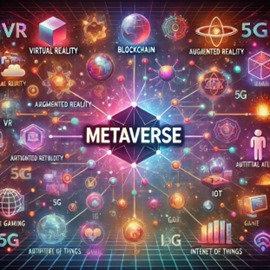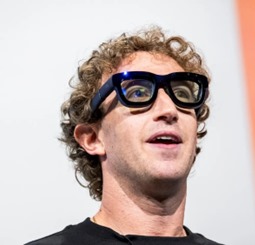The deep insights into Metaverse: The future and revolution of Industry
Introduction
Metaverse was first coined in 1992 by Neil Stevenson’s novel Snow Crash but had roots in history in the early 1970s in the gaming industry. It started to take shape in the early 2000s with the creation of online virtual worlds and MMOs (Massively Multiplayer Online Games). As social media and the internet evolved, the idea of virtual interaction grew stronger. The development of social networking platforms, video games, and virtual goods pushed the idea of a social metaverse forward. Metaverse is often considered to be the next fruition of the internet..
- Is metaverse the future of the business?
- Is Metaverse the game changer in tomorrow’s Global Economics as an Industrial Revolution?
- Is Metaverse the next-ever destination for businesses?
- Is metaverse dead or still alive?

A futuristic digital world featuring human-controlled avatars interacting in virtual spaces., with a mix of vibrant, positive elements and darker, more ominous areas, reflecting both the potential and the risks of future metaverse technologies.
Let us dive deep into understanding Metaverse technologies. Imagine a world where factories run themselves, machines know when they might break down, provide immersive real-time interactions, enhance customer experience and engineers work together in virtual spaces no matter where they are and mirror our own. Metaverse is here to change the future of the world.
Metaverse is a constant evolution that could change the phase of how we interact and converge the virtual and physical worlds. The future of the internet is going to be with cutting-edge technologies with immersive experiences, the parallel plane of existence a 3D virtual simulation of fictional elements, Web 3.0. Metaverse banks virtual retail and commerce, digital healthcare, tech education renovating how industries operate, deliver services, and interact with consumers.
Metaverse features include Augmented Reality (AR), Virtual reality (VR),5G & 6G Technologies, Cloud computing, Edge computing, Blockchain, NFTs
Mark Zuckerberg in 2021 announced his company to be named Meta. He has said in one of his talks on the future of Metaverse that he is building the future of human connection with AI, connecting people, and businesses they care about to make the world more connected. AI is transferring the experience with Metaverse technologies.
Meta’s new advanced Holographic AR glasses, ORION, unveiled are insane. They are wireless, weightless, and powered by a wrist-based neural interface. It is designed to deliver an immersive experience overlaying digital content onto the physical environment and is leaping into the world of modern computing. An innovation to the next level equipped with sensors and, key features like AI-based Voice Assistance, hand & eye tracking, and electromyography that can replace Quest headsets in future.


A few of the applications of ORION glasses include connecting teams in an augmented workspace, 3D prototyping, and real-time data visualization.
Fashion brands like Nike, Gucci, Balenciaga, Ralph Lauren, and Rtfkt have created virtual experiences for customers to explore their products, history and designs making their stand in the world of the metaverse.
Games like Fortnite, The Sandbox and Decentraland and Roblox allow players to engage in massive multiplayer experiences within dynamic digital worlds, where they can not only play games but also attend live events, concerts, and participate in social gatherings.
Walmart has developed an immersive world called Walmart Land, where people can play games, attend concerts and buy virtual merchandise for its avatars.
Apple has made a long-term play by unveiling a Mixed Reality headset called Vision Pro in 2024 evolving spatial computing, immersive and metaverse technologies. The headset features a resolution display, eye-tracking, hand-tracking, and gesture recognition that enables distinctive interactions within virtual spaces, augmented workspace to have enormous virtual world immersive experiences.
BMW’s first virtual factory made a significant groundbreaking move by opening a digital twin that run simulations on manufacturing operations and productions in a virtual environment integrating Industry 4.0 technologies. This was developed on NVIDIA’s Omniverse platform that facilitates real-time collaboration, premium design process, prediction and optimize manufacturing operations and efficient testing.


Interestingly, we can see movies that explore metaverse technologies with immersive experiences integrating advanced AI and spatial computing.

AVATAR(2009)
A dive into the immersive world, humans are portrayed as Avatars. The idea of “Remote Consciousness” embeds a metaverse where avatars are depicted in an interactive virtual environment.
READY PLAYER ONE (2018)
A movie with a fully immersive VR world called OASIS that incorporates 3D spaces, digital assets (avatars, items, currency), and social interaction within a virtual realm.
THE MATRIX (1999)
A simulated reality created by machines, where humans unknowingly live out their lives inside a virtual world, like how the metaverse will allow individuals to create digital identities and interact in a virtual world that might feel as real as the physical one.
GAMER -UNLEASH HIM (2009)
This movie mirrors the metaverse’s potential for human-controlled avatars to engage in virtual spaces revealing the dark side of the technology and highlighting both the beneficiary and exploitative challenges of the future.
FREE GUY(2021)
The virtual world in which Guy lives is a digital, gaming and immersive environment, by navigating between these realms, blurring the line between virtual and physical realities, building avatars, and completing quests.
Is metaverse the future of the business?
Metaverse can transform numerous aspects of our daily lives from filmmaking to producing medicine, and simulating manufacturing operations. The tech giants are profiting off the metaverse like Microsoft’s new acquisition of Activision Blizzard, Meta, Roblox and many more acquiring new technologies, expanding their platforms, and building virtual ecosystems. The business is moving towards tapping into new revenue streams like virtual real estate, branding with virtual goods, virtual workspaces, subscriptions, and advertising. With innovations and immersive experiences, the business strategy has taken a new path with virtual stores, personalized customer experience, new marketing avenues, next-gen platforms, and the digital economy. The rapidly evolving reality that could reshape the future of business and establish its capital market in business
Is Metaverse the game changer in tomorrow’s Global Economics as an Industrial Revolution?
A few of the Industries that make a greater impact with the revolution of the metaverse in the financial industry, the real estate market, the architecture and engineering industry, STEM education, the travel and tourism industry, media and entertainment, healthcare, e-commerce, the manufacturing industry and many more. The industrial metaverse is groundbreaking with huge potential to transform business competitiveness and productivity and is shaping Industry 4.0 with Virtual Digital Universe. The transformation of Business models with Digital twin technology has enhanced supply chain optimization, collaborative design and prototyping enabling identification of bottlenecks and streamlining operations to reduce costs and delivery time. companies like Walmart, Unilever, and Maersk manufacturers, Digital Twin technology is transforming business models by enabling businesses to understand better and optimize their operations. They are already exploring ways for new potentials to operate in a digitally immersive environment.
Is Metaverse the next-ever destination for businesses?
By 2026, it is anticipated that a quarter of the global population will dedicate at least an hour daily to activities within the metaverse, according to Gartner. Similarly, McKinsey & Company highlights the immense economic potential of the metaverse, projecting it could create up to $5 trillion in value by 2030—an opportunity businesses cannot afford to overlook. Metaverse has expanded its global reach so that businesses can tap into a diverse marketplace redesigning business models.
Is metaverse dead or still alive?
Not. It isn’t fading and is far from being dead. With early setbacks and challenges, Metaverse is evolving by refining itself into a new phase of growth using immersive technologies. It is still a significant area of development, investment, and innovation by top tech giants like Nvidia, Microsoft, and Apple who have made hefty investments and focusing on enterprise Metaverse applications
